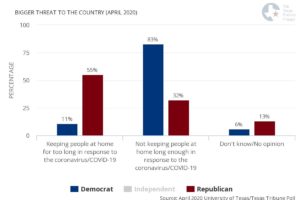AUSTIN, Texas - Although many Texas voters (66%) say that the coronavirus is a "significant crisis," they register higher levels of concern about the deepening economic problem and the impact it is having in their lives, according to the latest University of Texas/Texas Tribune Poll.
In a battery of questions asking 1,200 registered Texas voters their level of concern about current issues and problems, 54% indicated they were either extremely or very concerned about the spread of the coronavirus in their community. Larger majorities expressed the same extent of concern about the national economy (72%), Texas' economy (67%) and unemployment (75%).
When asked about their individual concerns, 54% were either extremely (33%) or very (21%) concerned about themselves or someone they knew getting the virus. Texans also indicated being extremely or very concerned about loss of savings or retirement funds (55%) and concerns about their physical safety or that of someone they know (54%).
Among other economic concerns: 34% were either extremely or very concerned about paying their bills; 31% about paying their rent or house payment; 27% about losing their job. The poll also found 30% of Texans expressing the same level of concern about interrupting their education or that of a family member.
"While Texans understand that the coronavirus is a significant crisis, the growing economic crisis is also exerting a powerful effect on attitudes," said James Henson, director of the Texas Politics Project at UT Austin and a co-director of the poll. "Many Texans are experiencing the effects of the deepening economic crises and are faced with managing high levels of concern about both COVID-19 and economic distress."

With Gov. Greg Abbott expected to loosen some elements of his stay-at-home order in the near future, 55% of Texas voters said that not keeping people at home long enough poses a larger threat to the country than keeping people at home for too long; 34% think the opposite, seeing the bigger threat in the result of extended stay-at-home orders. Here as in much of the survey, the poll found clear differences between Democratic and Republican perceptions of the crises: 11% of Democrats and 55% of Republicans think keeping people home too long is the bigger threat.
"Republican voters are much more likely to think that the virus is close to being contained, and that life will be going back to some version of normal," said Joshua Blank, research director of the Texas Politics Project. "Ideologically speaking, Democrats are generally more inclined to accept large-scale government intervention and Republicans more likely to elevate the importance of the economy, leading both groups, at least partially, to different conclusions about how, and how fast, to reopen the economy."
In a question about whom respondents trust to give them accurate information about COVID-19, medical and health professionals were trusted by 87% and distrusted by only 8%, and the Centers for Disease Control and Prevention was trusted by 70% and not trusted by 23%. Family and friends were trusted sources for 63%. Only 34% said they trusted the news media, and even fewer trusted social media, at 17%.
Among political figures included in questions about trust, 58% trusted information from Abbott, and 55% trusted what they learned from their local elected officials. President Donald Trump was considered a trusted source by 44%, but 49% were distrustful of information provided by the president.






